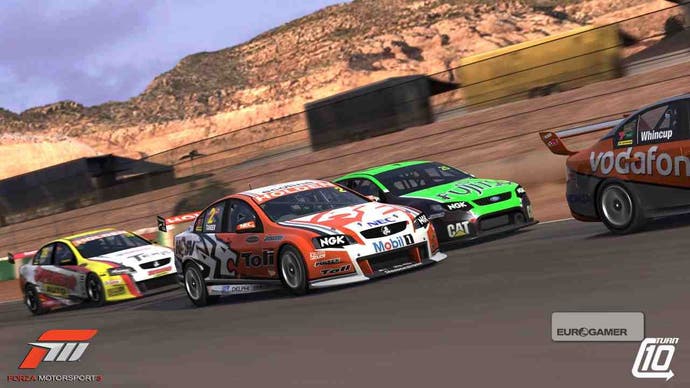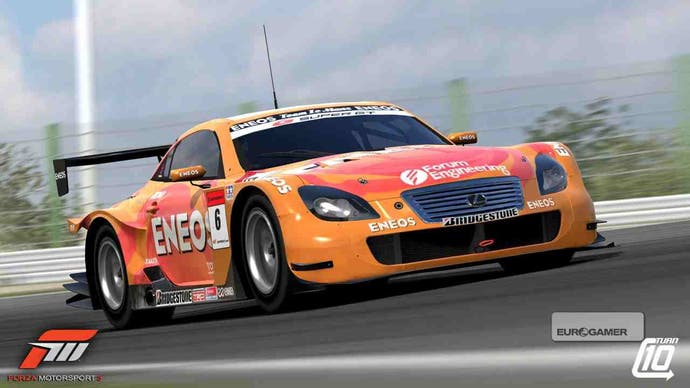Forza Motorsport 3
All will drive.
Is it naïve to think you can judge the character of a racing game from its choice of cover star? Probably. Yet the Project Gotham Racing series' love affair with Ferrari was perfectly suited to its flamboyant character; Race Driver GRID's hulking Dodge Viper in race trim captured its brutish, high-octane track-day drama. And Forza Motorsport 3 couldn't be more aptly summarised by the car that adorns the box (and kicks the racing campaign off in the obligatory high-speed teaser, before you're relegated to buzzing around in superminis): the Audi R8.
It's not, frankly, the prettiest of supercars. It's not the most soulful or thrilling, or, as our American friends would say, the most storied. It is, however, a paragon of ruthless and meticulous engineering excellence, a perfectly balanced, impossibly capable, surprisingly easy-to-handle all-rounder that doesn't need a hardcore enthusiast at the wheel to simply drive around the competition. That's Forza Motorsport 3 all over.
Audi has clearly been more than a commercial influence on the third in Microsoft's exemplary series. The classy, clinical understatement of the presentation, with its blinding white menus and note of cultured authority from narrator Peter Egan, is pure vorsprung durch technik. Developer Turn 10 has admitted that it's heading in the opposite direction to the loud Americanism of Codemasters' Racing Studio, seeking to give its game a high-end, European feel. It's a success, even if it has you reaching for the contrast controls before you're able to see some of the light-grey-on-white type - so quiet in its refinement that you can't actually read it.

Turn 10 has also made much of its effort to improve the accessibility of the console car simulator genre - the expansive hybrid of glossy catalogue, on-track simulation, customisation and long-form RPG progression defined by format rival Gran Turismo. The game's easy setting now offers extreme assistance: Forza can be set up to do all the braking and even some of the steering for you, so that even a small child can enjoy a shallow blast around its otherwise rather technical and challenging tracks. That will certainly open the game up to a few new players, although as with previous Forzas, its handling is so neutered on easier settings that it's difficult to wring much involvement or enjoyment from it.
But Turn 10's accessibility drive really hits home elsewhere, and in ways that can easily be appreciated by players at all levels. One is its lift of GRID's rewind button, a spot of feature-plagiarism that would seem cheeky if every other racing game hadn't copied Turn 10's brilliant implementation of the racing line guide in the first Forza. Rewind allows you to unspool crashes and missed corners at any point in single-player, with no limit or penalty (except a mark on your time-trial leaderboard listing).

Some might think it dumbs down simulation racing by stripping out risk, but they're free not to use it; and for everyone else, rewind strips out frustration and actually encourages a fuller appreciation of the game's depth, since it frees you up to try the more rewarding and fun higher difficulty settings without stymieing progress in the campaign, or having to submit to endless restarts to get good results. This doesn't just apply to driver assists and damage, but particularly to the AI difficulty too, which is something of a pushover on Normal but a tense challenge on Hard that, without rewind, most would forgo in favour of an easy life.
Turn 10 has also revolutionised car tuning and customisation with its "quick upgrade" option, which will work out a set of upgrades for your car, optimised for a given class or even specific event, at the push of a button. For those with no affinity for mechanics or stat-crunching - or simply no time and patience for tooling around in menus - it effortlessly opens up a side of the game that would otherwise remain a closed book, and permits them to get further with fewer cars, which are better to drive, for less money. Seasoned modders can simply ignore it and find the familiar wealth of detail and choice to get lost in.









